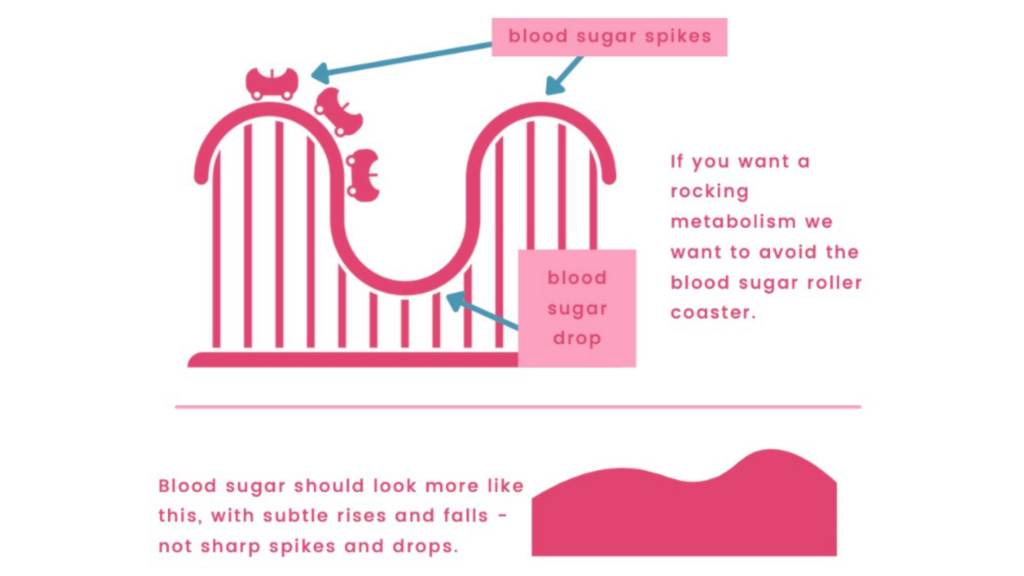“Calories are king!” “Calorie deficit!” “Eat less!”
This is what we hear the “Trainer Brads” and even our primary care doctors tell us over and over (and over) again. Calories are the most important thing for weight loss. Right?
NO. Here’s the thing: it’s not the full truth. It’s only one piece of the pie.
Note that I didn’t say it was an invisible piece of pie. It’s still real. Thermodynamics and energy balance are not a myth. It is important! But, like I said, it’s just one factor.
If your hormones (like thyroid or insulin) are not operating as they should, your calorie deficit won’t do a dang thing.
And this probably already makes some sense to you, right? You know how to count calories! You are probably really good at it actually (thank you, My Fitness Pal). But the weight just never seems to stay off. How can calories be king if you’re still struggling to lose the weight for good?
My favorite movie of all time is “My Big Fat Greek Wedding.” I’m a hopeless romantic, what can I say? I bring this up because there’s a scene in this movie where the mom talks to her daughter about her stubborn father.
She says, “A man may be the head of the house, but a woman is the neck, and she can turn the head any she wants.”

But this is also extremely applicable to how energy balance and hormones work in our body.
The head = calories
The neck = hormones
Calories and energy balance do play a big role. Many see it as the “head of the house” or the king of the weight loss equation. It’s the easiest explanation and solution to one of our biggest struggles.
But hormone balance is like the neck. It influences the ability for energy balance to function how it ideally should. If something is unbalanced with our hormone systems, it will hinder the body from responding to a calorie deficit like we want it to.
Hormone balance is the required foundation for successful long-term weight loss. You can’t skip over it and then wonder why you’re not succeeding.
Hormones > Calories
So if calories aren’t king, what hormones are so special?
Insulin and thyroid. There are others, but these have the most bang for your buck in the weight loss game. Let’s start with insulin.
Insulin
Insulin is a hormone produced by our pancreas. It is triggered for go-time when we eat carbohydrates or glucose. We need insulin in order to get the glucose from food that enters our bloodstream into our cells for energy or storage for later.
Aside from this main function, insulin is also considered a fat-storing hormone. It will store any extra glucose that we don’t need in the near future into our fat cells. Now, this is actually a good thing because we do need energy later, BUT, it becomes an issue when we constantly require insulin all day long.
The more often we need insulin, the more often our bodies are in fat-storing mode (not fat-burning mode). We do this unintentionally by:
- Eating too often throughout the day
- Eating too much added sugar and starchy carbohydrates
- Starting the day with a high-carb breakfast
- Not eating enough protein, fat, and fiber at meals
- Not getting enough sleep
- Not managing our stress
All of these factors on their own and combined cause us to ride what we like to call the “blood sugar roller coaster.” It’s the best way to not burn fat.

So, even if you’re working really diligently to eat fewer calories, if you’re not helping your body to be in fat-burning mode in the first place, the weight loss is going to be really, really hard.
Plus, staying in a calorie deficit is even harder when you’re riding this blood sugar roller coaster. The constant up and down leads to big cravings, and your hunger hormones are not going to be consistent. Being hangry and trying to eat less is not a strategy I would recommend.
Key takeaway: The body simply cannot burn fat when insulin is working overtime to manage your blood sugars.
Here’s what you can do to balance your blood sugar and put your body in fat-burning mode more often.
- Eat every 4 hours or so during the day. Think about eating MORE, less often.
- Eat protein, healthy fat, and fiber at every meal. This buffers the blood sugar response and requires less insulin. Learn more about this strategy here.
- Get enough sleep! I’m talking 7-8 hours at least. Inadequate sleep raises our blood sugars.
- Start your day with at least 30g of protein at breakfast. This helps blood sugars all day long.
- Actually manage your stress. Take time for yourself. Ask for help.
And bonus: these strategies are way easier to think about than counting the calories of every morsel you eat.
Thyroid
Thyroid hormone (TH) is produced by our thyroid gland, which is butter-fly shaped and located in the front of the neck. We need the thyroid hormone to regulate our metabolisms and do many other essential functions in the body. TH is actually referred to as T4 and then it’s converted into T3 (active thyroid hormone). T3 is what enters our cells and works its magic.
We run into issues when the thyroid gland itself becomes underactive (hypothyroidism) or when T3 can’t enter our cells in the first place.
If it’s a thyroid gland issue, addressing this with your doctor and starting medication is super important. Weight loss is almost impossible (no matter how big of a calorie deficit you’re in) without a properly supported thyroid gland to produce the hormones we need! You’ll know if it’s a thyroid gland issue from running a full thyroid panel with your practitioner.
Now, if your labs are fine but you still have some signs of an underactive thyroid, we might have a T3 issue. This is when active thyroid hormone is not able to enter your cells and do what you need for a healthy metabolism. So, we need to do some things to better support your hormone health:
- You absolutely need to be eating enough! Our thyroid gland needs enough food and carbohydrates specifically in order to produce enough active thyroid hormone to support your metabolism in the first place. Your big calorie deficit could actually be preventing you from losing weight.
- Your stress must be addressed. T3 has a hard time entering your cells and doing its job when there are too many stressors. These stressors can be actual life stressors, chronic undereating, chronic over-exercising, not getting enough sleep, not addressing inflammation, or food sensitivities. If you want more information on how to support your thyroid and possible culprits, check out this article.
Key takeaway: your metabolism cannot help you lose weight until your thyroid and related hormones are supported. Calories aren’t king when you’re eating too little.
Summary:
Do you see how silly “calories are king” sounds now? It’s like putting the cart before the horse. The stars must be aligned before you can even think about energy balance, and, honestly, always thinking about calories is NOT good for your mindset long-term.
Want to know any easier strategy for weight loss? Increasing your metabolism instead of decreasing your calories. This means eating like a normal person AND burning more calories while watching Netflix.
This is the heart of myDietitian. We know that decreasing calories significantly (typically in the form of a diet) does not work long-term. In fact, 95% of diets fail, with most people gaining the weight back in a surplus.
Your fellow calorie hater,
Elle, MM Coach

Enjoyed this article? Get more Nutrition 101 delivered straight to your inbox.
Unlock your best you.
Get daily nutrition you can count on with plans that work for your body.
Start today
Contact Us
Home
About
Why Us
Nutrition 101
© 2025 MyDietitian | All rights reserved | Privacy Policy
Connect
Join Our Newsletter